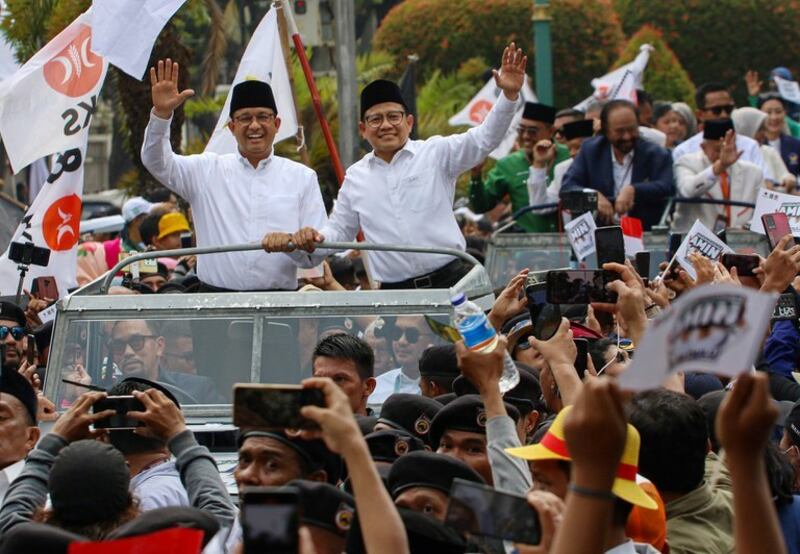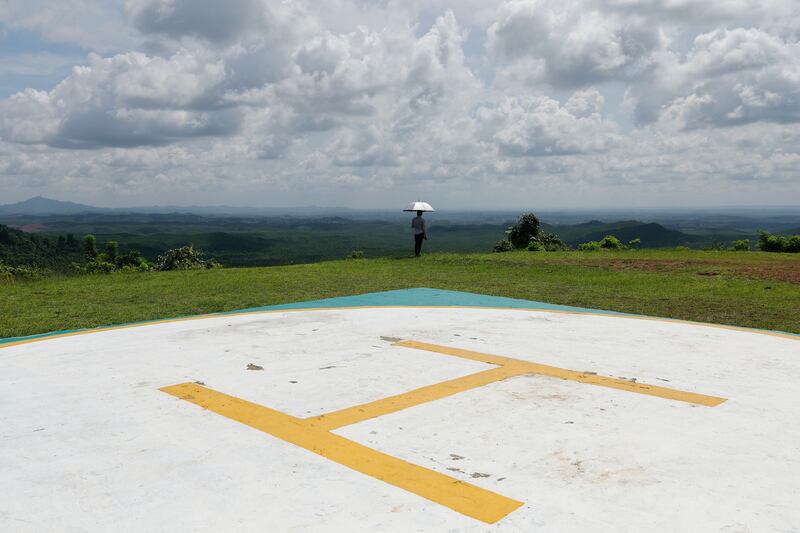Two pairs of candidates registered formally on Thursday for Indonesia’s presidential election early next year, setting the stage for what could be a tight race in the world’s third-largest democracy.
Anies Baswedan, the former Jakarta governor, and running mate Muhaimin Iskandar were the first to arrive at the General Election Commission’s office in central Jakarta while thousands of supporters filled the streets, as the period for candidates to register for the polls officially opened.
“The main idea is change, bringing equality, bringing justice. That’s what we bring,” Anies told reporters, outlining his pitch for the Feb. 14 election. “We want to make basic needs more affordable and to make farmers and fishermen live more prosperously.”
Anies and Muhaimin were followed by Ganjar Pranowo, a senior member of the ruling party and the former governor of Central Java, and his running mate Mohammad Mahfud MD, the current security minister.
Ganjar said he would build on the achievements of President Joko “Jokowi” Widodo, who is constituaitonally barred from seeking a third five-year term.
“What is clear is that I want to build Indonesia faster,” Ganjar said. “The good things that the government has done today, I will continue. The less good, I will improve. The bad, I will leave behind.”
Prabowo Subianto, the frontrunner who leads the nationalist Gerindra Party and serves as the country’s defense minister, has not yet announced his vice-presidential pick. Jokowi appointed Prabowo, a former army special forces general, as his defense chief after defeating him as his adversary in the two previous presidential elections.

The 2024 polls are expected to be a close contest between three coalitions of parties that offer different visions for the future of Indonesia, the world’s most populous Muslim-majority country and a full-fledged democracy for only the past 25 years.
Anies and Muhaimin are backed by a coalition of three parties led by the National Democratic Party, a secular party founded by media tycoon Surya Paloh.
Ganjar and Mahfud are supported by a coalition of four parties led by the Indonesian Democratic Party of Struggle, Jokowi’s party.
Some media reports predicted that Subianto, who’s leading the opinion polls, might pick Gibran Rakabuming Raka, President Jokowi’s eldest son and the mayor of Solo in Central Java, or Erick Thohir, a tycoon who serves as minister for state-owned enterprises.
Prabowo and Ganjar have enjoyed high popularity ratings in recent opinion surveys.
The possibility of a Prabowo-Gibran ticket was boosted by a Constitutional Court ruling this week that granted certain candidates exceptions for the minimum-age requirement for presidential and vice presidential candidates.
The decision by the court, whose chief judge is Jokowi’s brother-in-law, could pave the way for Gibran, 36, to contest the race as a vice-presidential candidate while his father prepares to leave office late next year, observers said.
The ruling has been widely criticized as nepotistic, with some legal experts warning it could undermine the democratic process.
Questions have trailed Jokowi about whether he is trying to keep his imprint on politics or build a political dynasty by promoting his family members and loyalists to government.
Jokowi, who enjoys high popularity, has not formally announced support for any pairing of candidates, but his giant volunteer network known as "Projo" has endorsed Prabowo for president.

Analysts said the candidates would try to appeal to a broad spectrum of voters, from religious conservatives to secular liberals, from urban elites to rural masses, from young millennials to old veterans.
Infrastructure development and economic growth are among the issues that are likely to decide the election.
One of the most ambitious and controversial projects of the current administration is the relocation of the capital city from Jakarta, a sprawling and congested megacity, to a new site in East Kalimantan on the island of Borneo.
The plan, which is expected to cost U.S. $33 billion, aims to ease the burden on Jakarta and create a more sustainable and livable city. However, it has also faced criticism for its environmental and social impact as well as its feasibility.
Jokowi this week asked China to expedite support for the new capital's construction, which has suffered several setbacks, including the withdrawal by a major Japanese investor, Softbank.
Yon Machmudi, a political analyst and associate professor of Middle East and Islamic studies at the University of Indonesia, said Anies would try to differentiate himself from the current government and highlight its failures in development and economy.
The Anies-Muhaimin ticket “represents a break from the policies of the current government,” Yon told BenarNews.
“They sense the people’s discontent and take it up as their cause. Anies is an outsider, so he offers a different option that people can pick.”
He said that religion was not a decisive factor in the presidential race because the teams of candidates formed balanced tickets that combine Islamic and secular credentials.
Indonesia’s relations with China, its largest trading partner and a major investor in infrastructure projects, will also likely be on debate podiums, said Idil Akbar, a political science lecturer at Padjadjaran University in Bandung.
He cited the recently completed high-speed Jakarta to Bandung railway, which was funded by China and part of its Belt and Road Initiative, as a contentious issue.
“The high-speed railway is a showcase of Jokowi’s legacy in infrastructure development. The candidates will try to highlight [its benefits or drawbacks],” he said.
The railway was initially billed at $6 billion, but an extra $1.2 billion was needed to meet rising construction costs and land compensation.

